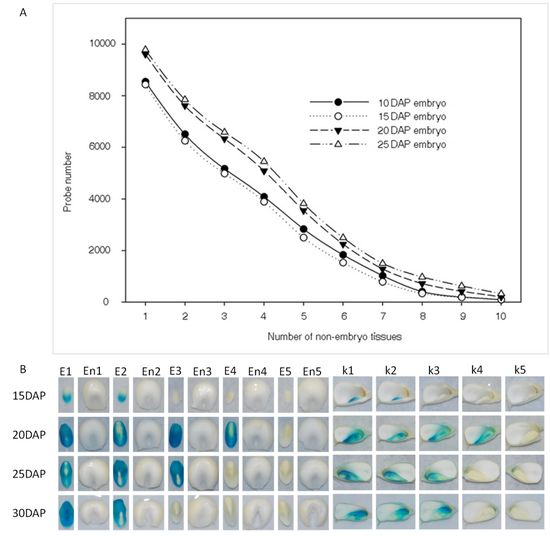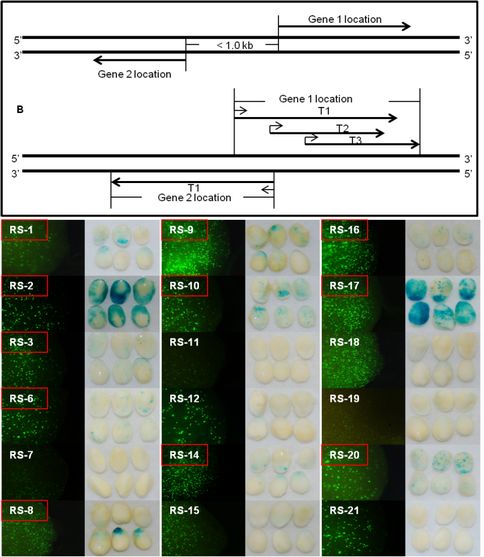分享到
New Advance in Maize Promoters Research
Recently, the research team, led by Academician Yunliu Fan, Biotechnology Research Institute (BRI) of CAAS, make further advance in maize promoters research. The results are published in Plant Biotechnology Journal and BMC Genomics respectively.
The team aims to overcome the shortage of maize promoter with Chinese independent intellectual property rights which constrain biotechnology breeding research and industrialization in China. Several novel maize embryo-specific promoters with tissues specificity and strong activity are identified by systematic research methods. Moreover, the team is the first one to report that bidirectional gene pairs are ubiquitous in maize genome and explore many bidirectional promoters that have application value which can provide precious promoter resources for agricultural biotechnology researches and development. The available tissue-specific promoter, which can be employed to drive foreign genes expression, is one of the limited factors in maize biotechnology breeding in China, especially the embryo-specific promoter that possesses proprietary intellectual property rights is limited.

Figure 1.Genome-wide screening, cloning and functional characterization of promoters specifically and strongly expressed in maize embryos

Figure 2: genome-wide searching bidirectional gene pairs and function characterization of bidirectional promoters in maize.
Article links:
http://onlinelibrary.wiley.com/doi/10.1111/pbi.12227/abstract;jsessionid=F42023D6A3B06E1D49EA3EA2C2585690.f03t01 http://www.biomedcentral.com/1471-2164/15/338
The team aims to overcome the shortage of maize promoter with Chinese independent intellectual property rights which constrain biotechnology breeding research and industrialization in China. Several novel maize embryo-specific promoters with tissues specificity and strong activity are identified by systematic research methods. Moreover, the team is the first one to report that bidirectional gene pairs are ubiquitous in maize genome and explore many bidirectional promoters that have application value which can provide precious promoter resources for agricultural biotechnology researches and development. The available tissue-specific promoter, which can be employed to drive foreign genes expression, is one of the limited factors in maize biotechnology breeding in China, especially the embryo-specific promoter that possesses proprietary intellectual property rights is limited.

Figure 1.Genome-wide screening, cloning and functional characterization of promoters specifically and strongly expressed in maize embryos
The research team took a genome-wide screening and found genes specifically and strongly expressed in maize embryos based on the analysis of one maize microarray data. Finally, they identified seven genes as embryo-specific genes with higher expression levels compared to maize globulin-1. The promoters of these embryo-specific genes were isolated and all exhibited strong promoter activities confirmed by transient or stable transformed in maize embryos (Figure 1).
Meanwhile, they firstly reported that bidirectional gene pairs are ubiquitous in maize, sorghum and soybean genome in another paper, and verified that the promoters which drive the bidirectional genes expression has function of bidirectional promoters. This work provides important theoretical foundation for multiple transformation and novel bidirectional promoter resources (Figure 2). The following research will intensively analyze these bidirectional and its application value serving for the development of agricultural biotechnology.
Meanwhile, they firstly reported that bidirectional gene pairs are ubiquitous in maize, sorghum and soybean genome in another paper, and verified that the promoters which drive the bidirectional genes expression has function of bidirectional promoters. This work provides important theoretical foundation for multiple transformation and novel bidirectional promoter resources (Figure 2). The following research will intensively analyze these bidirectional and its application value serving for the development of agricultural biotechnology.

Figure 2: genome-wide searching bidirectional gene pairs and function characterization of bidirectional promoters in maize.
Article links:
http://onlinelibrary.wiley.com/doi/10.1111/pbi.12227/abstract;jsessionid=F42023D6A3B06E1D49EA3EA2C2585690.f03t01 http://www.biomedcentral.com/1471-2164/15/338
Latest News
-
 Apr 18, 2024Opening Ceremony of the Training Workshop on Wheat Head Scab Resistance Breeding and Pest Control in Africa Held in CAAS
Apr 18, 2024Opening Ceremony of the Training Workshop on Wheat Head Scab Resistance Breeding and Pest Control in Africa Held in CAAS -
 Apr 03, 2024IPPCAAS Co-organized the Training Workshop on Management and Application of Biopesticides in Nepal
Apr 03, 2024IPPCAAS Co-organized the Training Workshop on Management and Application of Biopesticides in Nepal -
 Mar 28, 2024Delegation from the School of Agriculture and Food Science of University College Dublin, Ireland Visit to IAS, CAAS
Mar 28, 2024Delegation from the School of Agriculture and Food Science of University College Dublin, Ireland Visit to IAS, CAAS -
 Mar 25, 2024Director of World Food Prize Foundation visited GSCAAS
Mar 25, 2024Director of World Food Prize Foundation visited GSCAAS -
 Mar 20, 2024Institute of Crop Sciences (ICS) and Syngenta Group Global Seeds Advance Collaborative Research in the Seed Industry
Mar 20, 2024Institute of Crop Sciences (ICS) and Syngenta Group Global Seeds Advance Collaborative Research in the Seed Industry
